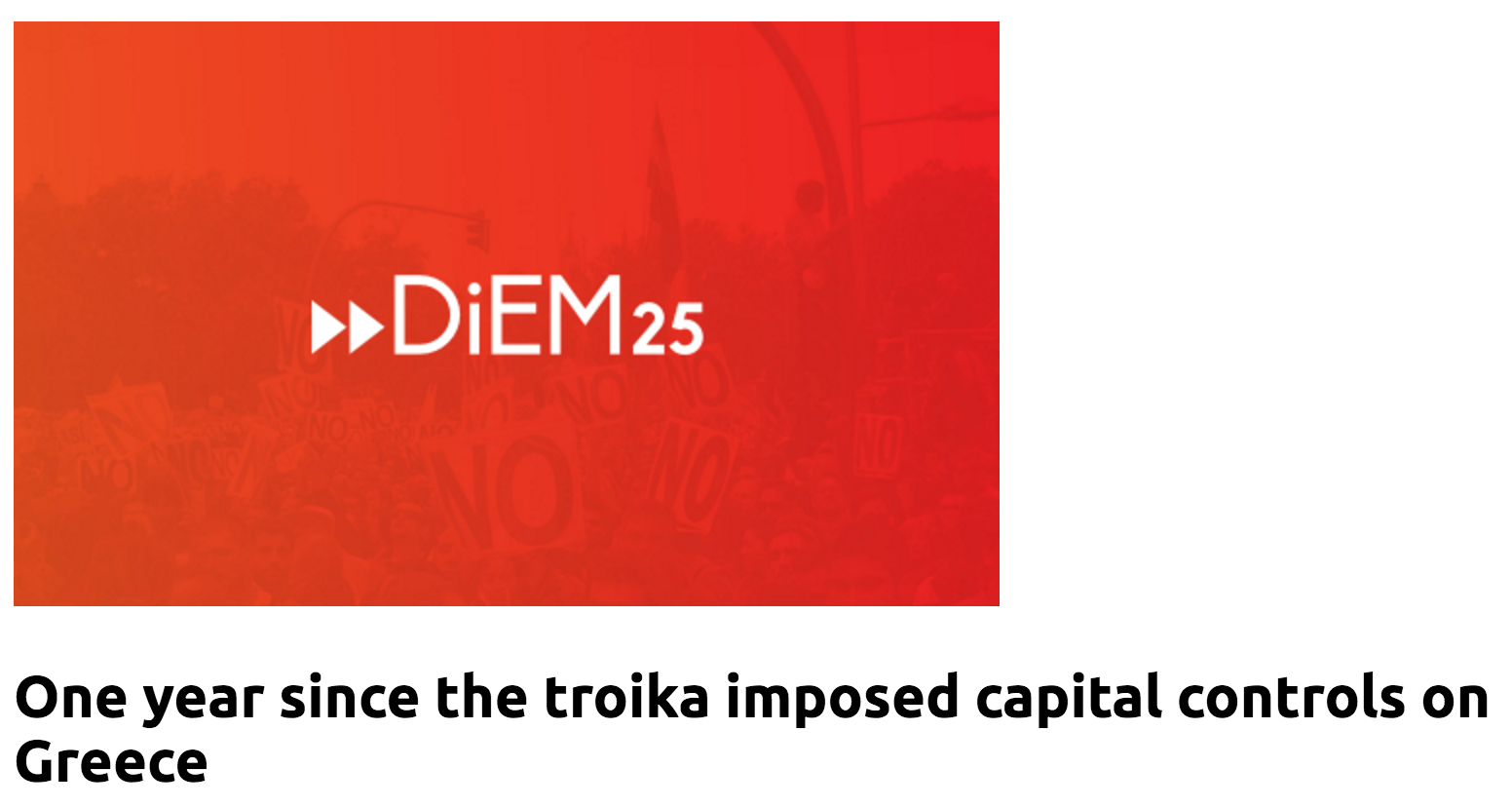 On the anniversary of the troika imposed capital controls on Greece, the struggle of the Greek people has become the struggle to save Europe – from the DiEM25 site
On the anniversary of the troika imposed capital controls on Greece, the struggle of the Greek people has become the struggle to save Europe – from the DiEM25 site
A year has passed since the troika and the ECB closed the Greek banks and imposed capital controls. During the same time, the same culprits are trying to lay the blame for their blatant violation of a monetary union’s logic on the Athens Spring and the Greek people’s determination to escape from the five-year long debt-bondage.
Let we forget,
- More than a month before the general election of January 2015, in mid December 2014, opinion polls were suggesting a Syriza victory. At that point the ECB triggered began a slow-burning bank run through its Greek representative (the Governor of the Greek Central Bank) who, astoundingly, warned of a “liquidity shortage” about to afflict Greek markets (a word first statement for any central banker in history). It was the first salvo fired against the oncoming Syriza government and a precursor to the capital controls that were always going to be the troika’s weapon against Greece’s anti-troika government.
- On 30th January 2015, three days after the new finance minister, Yanis Varoufakis, took office, the President of the Eurogroup, Mr Jeroen Dijjselbloem, told him in no uncertain terms that the Syriza government’s choice was clear: Either sign up to the troika plan, that Syriza had just won a mandate radically to re-negotiate, or the banks would close within a month.
- On 4th February 2015, without any tangible rationale, the ECB cut Greek banks off, referring them to the Central Bank of Greece’s ELA. It was the precursor to the bank closures and capital controls (the ‘Cyprus solution”, as it was called) with which the troika would attempt to subdue the Greek Prime Minister, Alexis Tsipras.
- By mid-April, a high-ranking official of the ECB, and a few days later the Governor of the Central Bank of Greece, encouraged Yanis Varoufakis to introduce capital controls. Naturally, he refused on the grounds that: (a) capital controls contradict the whole point and logic of a monetary union, and (b) the circumstances demanded an honourable agreement without capital controls or other so-called ‘solutions’.
- By December 2014, the small team around Alexis Tsipras who would (after 25th January 2015) form the core of the new government’s negotiating team had agreed (following written proposals by Yanis Varoufakis) to three counter-measures, against the ECB, when/if the ECB moved to shut down Greece’s banks and impose capital controls. Those three counter-measures were: (a) Signalling to the ECB that any move to shut down Greece’s banks would trigger the Greek government’s unilateral restructuring of the Greek government bonds owned by the ECB (a move that the ECB would want to avert at all cost, given its repercussions on the legal standing of its OMT and QE programs), (b) Setting up a parallel euro-denominated digital payments system, and (c) Changing the Law governing the Central Bank of Greece to regain national sovereignty over it.
- At some point, between March and end of April, against the recommendations of Yanis Varoufakis, PM Tsipras began to drift toward the view that the above three counter-measures (see 5 above) should not be activated. Thus, the troika, having received word that the Athens government would not react to bank closures in a manner that would hurt the ECB, gave the green light to the ECB to proceed with them – and with the imposition of capital controls.
- Despite the hardship, uncertainty and liquidity asphyxiation caused by the bank closures and the capital controls, the Greek people courageously backed the government, with that remarkable 62% OXI vote. They said, in other words, NO to the troika’s blackmail and ordered the government to continue to fight, with all available means, for an honourable agreement.
- On the night of the referendum, PM Tsipras decided to throw in the towel. From that moment onwards, the troika and its Greek (local) ‘associates’ began the attempt to blame the troika-inspired and implemented capital controls on Yanis Varoufakis and all those who continued to remain faithful to the principles and spirit of the Athens Spring.
- A year later, in the wake of an already failed 3rd Bailout Greek ‘program’, capital controls remain in place for the sole purpose of reminding PM Tsipras that he remains under the troika’s thumb.
Today, a year after the ECB-led coup d’etat against Greece, the EU is disintegrating. The struggle of the Greek people for an honourable agreement with Brussels has now become the struggle for all European democrats to save Europe from its incompetent, authoritarian and historically challenged administrators.














